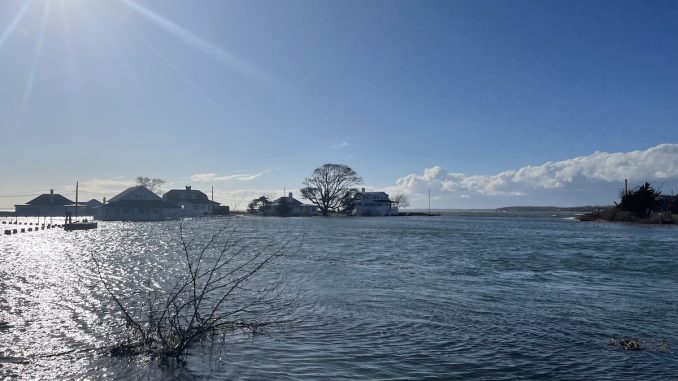
On Saturday, Jan. 13, the impact of rising sea and bay levels was on full display all across the North Fork, particularly in Southold Town. If the remarkably high tide Saturday afternoon — produced without a full moon or a major nor’easter — was the saltwater equivalent of the canary in the coal mine, Southold in particular is facing real challenges.
Just looking at one stretch of the North Fork — along Grathwohl Road and New Suffolk Avenue in New Suffolk and Cutchogue at around 3 p.m. — two hours after the 12:50 p.m. high tide — the water was still covering the Downs Creek bridge and at road level on the West Creek bridge at Kimogenor Point.
Grathwohl Road, which skirts the western rim of West Creek, was fully underwater certain areas. Road access to the homes on Kimogenor Point was washed out, with the pool of creek water extending west of the access road into an adjacent field by the tennis courts.
The homes on the Point — an idyllic summer community — sit on a narrow point of sand with water on two sides. Had any of them been occupied as the tide rose and someone needed help, first responders could not have used the road to reach them without special equipment.
The homes on the Point and along Grathwohl Road are valued in the tens of millions of dollars. And that’s just a small part of the North Fork.
Reports Saturday and Sunday, from Orient west to parts of Riverhead Town, showed tidal levels and flooded streets that some said exceeded those produced by Superstorm Sandy in October 2012.
Two Southold Town officials who monitored the tides over the weekend, newly elected supervisor Al Krupski and Highway Superintendent Dan Goodwin, grew increasingly concerned.
For Mr. Goodwin, it meant rushing crews to flooded roads to make sure no lives were in danger and putting up cones or sawhorses to block access. In dozens of places, he said, the bay and creeks rose to extraordinarily high levels, flooding areas already fully saturated from the roughly 12 inches of rain that has fallen here since early December, according to town gauges.
“Cedar Beach at the end of Main Bayview [Road], where the old inn used to be, was under a foot of water,” he said. “Water was all over the end of Narrow River Road in Orient. Grathwohl Road in New Suffolk is one of the lowest lying roads in town and it was in trouble.”
Mr. Goodwin pointed out extreme high tides no longer need a full moon — the next of which is Jan. 25 — or a major storm to flood streets and endanger homes, even homes not near saltwater but where groundwater is high.
“We can close off roads, we can pump out places, but there’s only so much we can do,” he said. “Going forward, we want to study Grathwohl Road as a kind of ‘ground zero’ for what we can do around town. But whatever is happening, we need to hit the ground running.”
Mr. Krupski said there is no question that sea and bay water levels, storms and high tides, will continue to impact large areas of the North Fork. He said he has asked local officials to prepare maps to show which parts of the town — and its infrastructure — are most at risk.
“There were reports of the tide all over town throughout the weekend,” he said Monday.
Mr. Krupski said the town engineering and highway departments will prepare a map where flooding is rampant with the goal of creating an overlay map highlighting the areas where high water endangers town-, state- and county-owned roads.
He said public safety is a major consideration. Can rescuers reach a home if the roads around it are flooded?
“Once we get the map done, we will bring people in and begin to plan how to make improvements on town-owned property,” the supervisor said. “This is now our reality, and we have to adjust to it quickly.
“What are our options?” he added. “Sea level rise has changed everything.”

